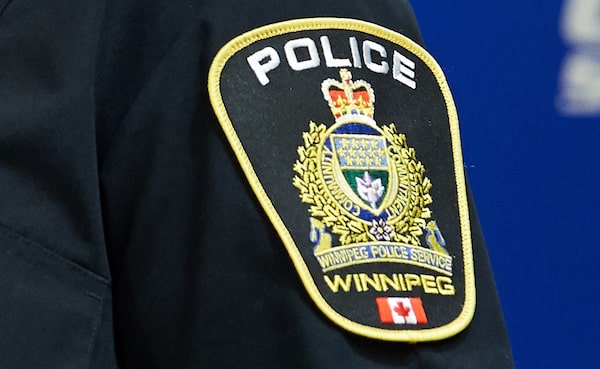
A Winnipeg Police Service shoulder badge is seen on Sept. 2, 2021 at the Public Information Office in Winnipeg.David Lipnowski/The Canadian Press
Manitoba’s police watchdog is investigating the death of a Winnipeg man after police fatally shot the man while trying to hospitalize him for mental health concerns.
Police said officers went to the North End home of the 59-year-old man on Tuesday morning to take him to the hospital for a nonvoluntary examination under the province’s Mental Health Act.
At a news conference on Wednesday, police said when officers arrived the man answered the door allegedly holding a crowbar and seemed agitated.
When they tried to approach the man, he discharged a fire extinguisher before locking himself inside the home. The officers made several attempts to speak with man but weren’t successful.
They were eventually able to get inside the home and tried to speak with the man who eventually barricaded himself in an upstairs bedroom.
Police said the man later left the room allegedly carrying a weapon when police fired their guns.
Deputy Chief Art Stannard said this has impacted the force as no officer wants to be involved in a lethal encounter.
“Police officers take an oath to protect life, and they take that very seriously. They respect the life. They want to help people,” he told reporters.
“In this case, they’re mandated by the Mental Health Act to take the male into custody and take him for a medical assessment.”
Officers provided medical care on scene before the man was rushed to hospital in critical condition. He later died from his injuries.
Police said they received the order to pick up the man last week but were unsuccessful in their attempts.
In the past three months, the Independent Investigation Unit of Manitoba has launched other investigations into the deaths of three men who died during police interactions.
Wellness calls continue to be the top citizen-generated call for service the police to handle, said Supt. Bonnie Emerson.
“The level of violence and the calls for service that police are mandated to respond to are escalating,” she said.
“Mental health can deeply impact people’s well-being. Events are emotionally charged, and our members have limited information when they’re responding.”
Police were required to detain more than 1,100 people last year under the Mental Health Act.
Emerson said the force relies on a number of community partnerships, but in high-risk situations they can’t call in civilians.
A number of advocates have called for a shift in who responds to mental wellness calls, arguing the presence of uniformed police can escalate a tense situation.
The city started a pilot project in 2021 that pairs up a plain clothes officer with a mental health clinician to respond to people experiencing a mental health crisis when it is deemed safe enough to do so.
Stannard said this wasn’t the case on Tuesday.